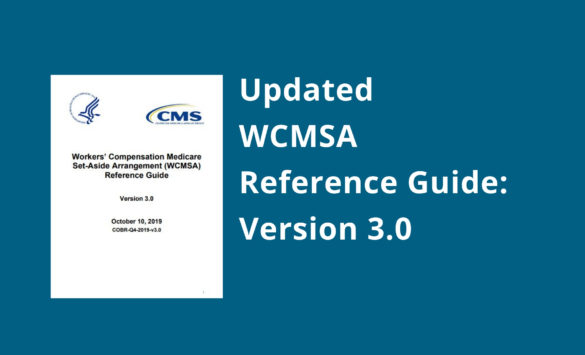On October 30, 2019, the Centers for Medicare & Medicaid Services (CMS) announced that Version 3.0 of the Workers’ Compensation Medicare Set Aside Arrangement (WCMSA) Reference Guide is available. The updated reference guide can be found here. Version 3.0 is dated October 10, 2019 though it was just released this week.
The most significant change to this version of the Reference Guide is that CMS provided new expectations for competent professional administration of WCMSA funds when “frequently abused drugs” are prescribed for the injured party. This is the first step CMS has taken to address the risks of opioid use by MSA beneficiaries. CMS provides an important guideline in “highly recommend[ing]” professional administration for these individuals and to require administrators to abide by safety protocols mandated for Medicare Part D plans. Quotes and comments below:
- “CMS highly recommends professional administration where a claimant is taking controlled substances that CMS determines are ‘frequently abused drugs’ according to CMS’ Part D Drug Utilization Review (DUR) policy. That policy and supporting information are available here.” (See Sec. 17.1.)
- For 2019, CMS has identified opioids and benzodiazepines as frequently abused drugs. See page 2 of: A Prescriber’s Guide to the New Medicare Part D Opioid Overutilization Policies for 2019
- “CMS expects that WCMSA funds be competently administered in accordance with all Medicare coverage guidelines, including but not limited to CMS’ Part D Drug Utilization Review (DUR) policy. All professional administration programs should institute Drug Management Programs (DMPs) (as described more fully here) for claimants at risk for abuse or misuse of “frequently abused drugs.” (See Sec. 17.3.)
- Within Sec. 17.1, CMS continues to “highly recommend” professional administration as it did in prior versions, regardless of the scenario, by indicating that: “[a]lthough beneficiaries may act as their own administrators, it is highly recommended that settlement recipients consider the use of a professional administrator for their funds.”
- CMS also updated the reference guide to account for changes in the WCMSAP, which now includes a Professional Administrator role, with new functionality to upload account transactions and view account details, and the ability to submit attestations online for all others (See Sec. 17.6). Ametros published an article recently on the Portal changes.
In the Larger Scheme of Things
Ametros commends CMS for continuing to “highly recommend” professional administration, and specifically, for highly recommending the service in instances where the claimant is utilizing prescriptions that are classified as “frequently abused drugs.” These directives have several important consequences for the industry and MSA recipients.
- Emphasis on Safety with Professional Administration. The changes show CMS’s recognition that steps need to be taken after settlement to proactively protect injured workers and that professional administration is the way to accomplish this. On the other hand, these guidelines also highlight the safety risk to the injured individual who decides to go against CMS’ recommendation and self-administer their funds. With self-administration, the injured individual becomes a cash-pay patient using their MSA funds and will not be able to abide by drug management or Part D safeguards. What CMS is emphasizing with these new guidelines is that individuals pursuing treatment with an MSA should benefit from the same levels of protection that a standard Medicare Part D recipient would receive. It’s important to note that none of these Part D safeguards prevent an individual from receiving the proper care they need, but they do add needed guardrails to ensure that they’re on a safe path to health.
- Comfort for Settling Parties. For attorneys and primary payers involved in settlements, there has long been a concern about settling cases where the Medicare Set Aside projects the injured party to continue to receive large quantities of controlled substances, such as opioids or benzodiazepines. These new guidelines provide advisors to a settlement with a path to settle the case and to have more comfort around ensuring that the injured individual will not be making poor health decisions and a process is in place to mitigate against potential future exposure. While many have already adopted policies to offer professional administration on all Medicare Set Aside cases, these new guidelines will also allow them to develop policies to ensure that cases where the injured party is using frequently abused drugs are especially flagged for professional administration.
- A Higher Standard of Oversight for Administrators. Finally, via changes in the new reference guide, CMS is also holding professional administrators to a higher standard and this is a welcome acknowledgment of the important role that professional administration plays in the quality of care for an injured individual after settlement. At Ametros we already have extensive safety edits and oversight built into our claims approval process. We are ready to apply these new guidelines to our professional administration services and welcome CMS’s continued efforts to improve the lives of our Members.
Appendix
There were also some other changes to the reference guide mostly regarding the submission and review of MSA’s. A brief summary of those changes is also listed below:
- The time-period for submission of Amended Review requests has been extended from 4 to 6 years (Sec. 16.2)
- The Consent to Release Form now includes an indication that the beneficiary understands the intent, process, and administration requirements of WCMSAs (Sec. 10.2 and Appendix 6:10)
- Addresses have been corrected or clarified for reporting workers’ compensation cases for sending yearly WCSMA account attestations; and for sending WCMSA proposals, final settlements, and re-review requests (Sec. 2.2, 17.5, and 17.6)
- The Life Table link has been updated (Sec. 10.3)
- CMS has clarified how hospital fee schedules are determined (Section 9.4.3).
- The “Death of a Claimant” information has been updated and standardized with the Self-Administration Toolkit for WCMSAs (See Sec. 19.2).


